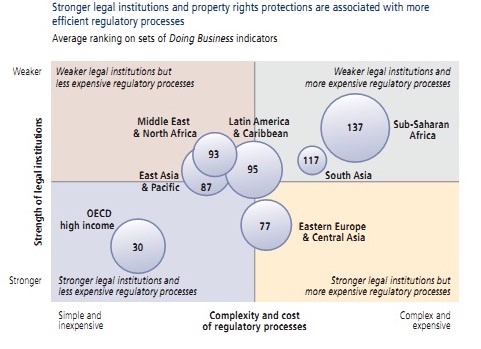When considering top destinations for expatriation, several surveys and rankings point to factors such as attractiveness of lifestyle, weather conditions, cost of living and friendliness of the local population – all of which are important for someone who makes a relocation decision. However, in addition to these conditions the business environment of the foreign country is also playing a crucial role, especially for self-initiated expats who move on their own accounts to do business abroad. The current changes in migratory patterns caused by the recent financial crisis are a case in point. Thus, people relocating with a plan of doing business abroad are highly likely to include business friendliness as one of their top destination criteria.
The Doing Business 2012 report aimed to benchmark countries related to their business indicators by comparing regulations in domestic firms for 183 economies. The report is a co-publication of The World Bank and the International Finance Corporation, and is already in its ninth edition of annual reports that examine the enablers and constraints of business activity across different countries.
Economic activity requires good rules, which make doing business a transparent and accessible process. Rules and regulations are meant to establish and clarify rights and, in doing so, also reduce the cost of resolving disputes. In other words, such regulations should efficiently keep balance between protecting important aspects of the business environment and avoiding abuse, thus providing certainty for the parts involved. Another aspect highlighted in the report is accessibility of rules and regulations. When business regulations are burdensome, they may inhibit ‘fair’ entrepreneurship and create an environment where success depends more on one’s political capital. On the other hand, where regulations are relatively easy to comply with, talent and good ideas should determine the success in growing a business.
Following these fundamental ideas, the 2012 report ranks economies based on 10 areas of regulation, namely starting a business, dealing with construction permits, getting electricity, registering property, getting credit, protecting investors, paying taxes, trading across borders, enforcing contracts and resolving insolvency, and employing workers. The rankings on these 10 indicators for each of the 183 countries were then averaged to indicate an aggregate ‘ease of doing business’ ranking. The Doing Business 2012 report concludes that the Top 10 business friendly countries are as follows: Singapore; Hong Kong SAR, China; New Zealand; the United States; Denmark; Norway; the United Kingdom; the Republic of Korea; Iceland; and Ireland. The most unfriendly business regulations were found to be in Chad (rank 183), Central African Republic (rank 182) and Congo republic (rank 181).
Apart from the general rankings, from a global perspective the report authors note that more efficient regulatory processes often go hand-in-hand with stronger legal institutions and property rights protections. More specifically, the authors argue that there is an association between two dimensions, ‘the strength of legal institutions and property rights protections’, and ‘the complexity and cost of regulatory processes’. Grouping countries by larger regions, the report also maps their average rankings on the two mentioned dimensions, concluding that ‘OECD (Organization for Economic Co-operation and Development) high-income economies, by a large margin, have the world’s most business-friendly environment on both dimensions’ (see the following figure).
Note: Strength of legal institutions refers to the average ranking in getting credit, protecting investors, enforcing contracts and resolving insolvency. Complexity and cost of regulatory processes refers to the average ranking in starting a business, dealing with construction permits, getting electricity, registering property, paying taxes and trading across borders. The size of the bubble refl ects the number of economies in each region and the number is the average ranking on the ease of doing business for the region.
Source: Doing Business 2012 report: Doing Business in a More Transperent World.



Doing business aboard also depends on political stability of that country. this discussion is exactly focused. it is a good statistical research data.
Thank you.
La Jolla Schools
I agree with you. In addition, it also depends with the economic stability of the target region. This topic is so broad.
I would like to find Poland among the Top 10 business friendly countries some day.
Working abroad is both a great opportunity and a major challenge – on a professional as well as on a personal level. When the dream of working abroad suddenly comes true, many a freshly-made expat is taken by surprise. We have compiled a guide to help you deal with the challenges of working abroad.
I have found each country has strength’s and weaknesses depending on industry. It’s best to evaluate tax policies, education, work force, technology, work ethic, regulations, and entrance costs before making that decision.
I live in China but last five years I’ve involved with couple of business in Bangladesh and India. Five years back condition was good but through out last five years situation is changed for business progress because of both these countries political ups and downs and lacking of commitment. So I think doing business in abroad is also need to consider expected country political and other commitments accuracy. Thanks.
I also live in China.
To the things to consider, when going to make business abroad, I would also add the “Level of Corruption” in the country. In China you cannot make any step forward without meeting with this obstacle.
Thank you
I live in iNDIA.
To the things to consider, when going to make business abroad, I would also add the “Level of Corruption” in the country. In INDIA you cannot make any step forward without meeting with this obstacle.
Unfortunately corruption plagues all countries, it will only change when the cost of corruption is greater than the principle.
My wife and I have discussed this idea on numerous occasions. Costa Rica was our place of choice. But our plans were disrupted by the state of insanity this world has become.